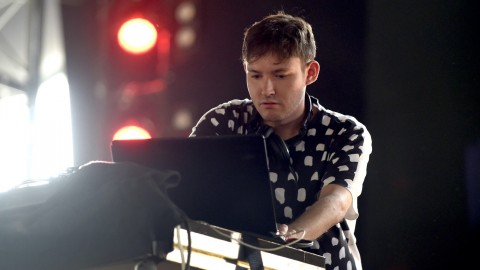
Royal Blood are just like us, you see. When we arrive in west London for their fourth NME cover shoot, frontman Mike Kerr and drummer Ben Thatcher are enjoying what many were desperate for this week: a little trim. “First haircut of the year,” beams Thatcher, stroking his freshly-shaven scalp, but the “hat goes straight back on”, he laughs completing the trademark look. “You never see my hair so it really doesn’t matter.”
But the sight of Kerr getting his hair done inspires a pang of déjà vu. Those of you who may also move in certain indie circles on social media might be familiar with a 2018 photo that does the rounds every now and again of the singer getting a VIP buzzcut from one Mr Alex Turner. “Did it go viral?” laughs Kerr when we remind him of the backstage photo. “He’s a great hairdresser. A lot of people don’t know that. It’s a slightly more intricate trim today than the one that he performed, but he is capable of more. I think he knows that as well.”

It was a lot more than his luscious locks that Kerr lost on the last round of shows of the gruelling tour for their second chart-topping album, ‘How Did We Get So Dark?’ – he’d also lost his way.
Few bands enjoy a heady ascent like that of Royal Blood. Having played in bands together while growing up in Brighton, they eventually formed as the duo in 2011. Just two years later, they were blowing up online, this time owing to one of Turner’s bandmates when Arctic Monkeys’ drummer Matt Helders proudly wore a Royal Blood t-shirt throughout their triumphant Glastonbury headline set in 2013.
A year later, Royal Blood’s self-titled debut became one of the fastest-selling UK debuts of the decade: it shifted 66,000 in the first week alone. That’s more than first efforts from the likes of The Strokes, Arcade Fire and even Linkin bloody Park.

They once described the success of their debut to NME as “a ramp of insanity”. Now, with the benefit of hindsight, they admit that they may have suffered from a little vertigo – the pressure of expectation shaped their 2017 follow-up ‘How Did We Get So Dark?’.
“It just wasn’t normal,” Kerr says of the rise. “The usual progression is that your career and your fans grow with you on a nice and gentle lead up, whereas for us it was straight to the top. We’d only just worked out how to be in a band. We’d played together for our whole lives, but the thing was successful as soon as we put it out.
“It just really got in my head. [‘How Did We Get So Dark’] was the first time where we’d ever made something knowing that people were going to hear it. It made me question everything I was doing and oddly doubt myself. If you can’t trust yourself, then creativity goes out the window. All you really have is your own faith in what you’re doing. For me, it was difficult to be on your own side first.”

The pair eventually landed on a new and improved design for album three. ‘Typhoons’ (out April 30) is a kaleidoscopic and disco-tinged evolution, adding a dash of colour to their previously monochromatic palette. They’ve also invited their love of Daft Punk, Justice, Goldfrapp and the late don of French house Philippe Zdar to the party; their primal rock stomp now has a lot more of a swaggering strut to it.
“Our second album was a careful step forwards whereas this one is a very confident and joyous leap forwards,” says Kerr. “I really love that record, but this one wasn’t made in fear. It was made from a much more inspired place.”
Inspiration came at great personal cost. On their blacker-than-black previous NME cover story, Kerr told us how he ritualistically destroyed his bass on the last show of their first album tour to feel as if he could truly start again. Did he opt in a similar fashion for this rebirth?
“I really love our second record, but this one wasn’t made in fear” – Mike Kerr
“I wasn’t really functioning very well after the end of that second tour,” says Kerr. “Instead of destroying the bass, I was basically destroying myself. I got to a point in my life where I had to change my life and reorganise everything. Part of getting fucked up and exhibiting that is also a way of asking for help; you almost want someone to catch you being in a state. The darkest thing is that you can get away with insane shit and it can go unnoticed.”
The touring cycle of drinks, drugs and decadence had left him a husk, and the hangover spilled out of the tour bus and into his personal life.
“The problem wasn’t what was happening; the problem was me,” he says. “The journey we went on was incredible, but for me and the way I handle things, I didn’t know that I didn’t have an ‘off’ switch. By the time we were touring the second album I was like, ‘Oh, I’m this guy now – I can’t stop now. I have to go further than anyone else’. Being someone who didn’t want the party to stop meant that I didn’t stop the party when I got home. It’s like coming back to work but still thinking you’re on holiday in Ibiza, wearing a Hawaiian shirt while you cook a barbecue up in the office.”
Thatcher had also started to notice his friend going awry. “There were times when he had gone too far and lost his vision for things. Obviously I’m a different person and I do have an off-switch, but sobriety has just been a great thing for Mike. I supported him in any way I could, but it was something that he needed to work out for himself. You’ve gotta want it and have a lot of self control. He had that when he got back from Vegas.”

Kerr’s “epiphany” would occur in a bar in Las Vegas in early 2019 while recouping from the road. Having just ordered an espresso martini, he instinctively decided that something had to give, and that this would be his final drink. “I was able to see into the future and where my life was going to go,” he says. “I could see the end of the trajectory, and at the end of it I had lost everything. I didn’t have the band, I had nothing. I felt snookered. I had attempted to remove drugs and alcohol from my life in these tidy little periods from my life where I’d refrained, but ultimately it was like I was tumbling down the hill.
“Sobriety was something I knew I had to do in order to make this record. This album or this band wouldn’t exist if I hadn’t have done this. It was all quite scary.”
The next day he downloaded an app to assist him on his mission to get clean, marking down that his reason was “for my happiness and my creativity”. The road to recovery began. “It’s not like the next day your life is back in order, it’s like day one of cleaning,” he says. “It felt like turning up to an earthquake disaster with a dustpan and brush. I was like, ‘God, where do I begin?’”
The new sense of purpose left Kerr feeling renewed and the album soon started to take shape. An early test came in his sobriety’s infancy when the band headed out to the desert to record new single ‘Boilermaker’ with touring buddy and mentor Josh Homme of Queens Of The Stone Age.
“I was able to see into the future and where my life was going to go, and at the end of it I had lost everything” – Mike Kerr
“I think he was the first person to pour me a drink,” says Kerr. “He handed me tequila and I was like, ‘No, I’m alright’. He just said ‘cool’, and kept dancing. He came back and offered again, I said no, and he asked what was going on. I told him I wasn’t drinking, he was like, ‘That’s cool’, and everything just carried on.”
Allowing Kerr and Thatcher access to his vast wardrobe of wigs and fancy dress, Homme brought a little “childlike creativity” into the mix and urged the band to cut loose. While the rest of ‘Typhoons’ would be self-produced (aside from ‘Who Needs Friends’, which was assisted by the magic-making, Grammy-winning Paul Epworth), that playful spirit of abandon and constantly asking “what if?” would carry the band through.
“Looking back, it was a really pivotal moment,” says Kerr. “I got sober that week and ‘Boilermaker’ was the first thing we tracked for the record, but we also walked out of that session with the bar raised really high. I said, ‘I’ve only just got sober so I need to go sort my shit out, but when we come back we’ve got to match this’.”
While ‘Boilermaker’ would become the “smoke grenade in the middle of the record”, complete with the swing-band bombast and finger-clickin’ badassery that Homme does so well, the groove that drove the rest of the album would take time to shape. The more euphoric and danceable the sound, the more Kerr allowed himself to be vulnerable in his songwriting for the first time.

Look no further than the lead single ‘Trouble’s Coming’. It may sound, as Kerr so poetically puts it, “like a heavy version of the Bee Gees” or “a pro wrestler trying to toss a salad,” but it soundtracks someone having a very thorough word with themselves in the mirror as shit gets real. “This set the tone for the rest of the record; it was this idea of Royal Blood being in colour.”
There are plenty of clues to map out Kerr’s struggles and recovery on ‘Typhoons’. The title track is by far the most explicit: “All these chemicals dancing through my veins / They don’t kill the cause – they just numb the pain”. On the cosmic dance-rock of ‘Limbo’, Kerr paints a grizzly picture when he would “wake up every morning, almost surprised I survived”.
As part of his programme of sobriety, Kerr has become an advocate for passing on his newfound wisdom not only to those around him, but to anyone who might see themselves in these new songs.
“There are people in my life now who have got sober, and now helping fucking crack addicts,” says Kerr. “It’s amazing. Someone reached out to me that way. I feel like I have a responsibility to myself through lyric-writing. It was important for me to be open about it, because I know I’m not alone in these experiences. I had the confidence to do that because I was clean and sober. I didn’t need to hide behind anything any more. When the album comes out I’ll probably feel like, ‘Oh my goodness! Here’s my diary!’ But I like to think it’s poetic enough to not be crass.”
“The music was so euphoric, that it gave me more of a licence to be vulnerable” – Mike Kerr
As so many touring musicians or just anyone who’s struggled with lockdown may have learned, the idea of sobriety can seem totally unfathomable, but now Kerr wants to normalise the conversation. “It can be a very lonely experience because you can be the only one doing it, especially in our country where drinking is a part of our culture. It’s so engrained, especially with guys; there’s a macho thing to it. There could be more voices, because I know there are a lot of sober people in the music industry.”
At this point, Thatcher turns to his bandmate to pay tribute to the sheer resolve and independence that he’s shown in the last two years. “You really did a lot on your own, though,” he says. “You had a lot of self-control. You had to grit your teeth through a lot of the time and kept a level head. It’s so easy to just get carried away, especially when you’re on tour.”

Kerr successfully ran the gamut in 2019, when he completed his first tour while sober. At their enormous Reading & Leeds appearance that summer, they seemed a band reborn. It was “a whole new way” of playing live, Kerr says, feeling “more connected to the fans as individuals” without the haze of being a little bit too pissed.
“I felt like I just wasn’t there a lot of the time before,” says Kerr. “I realised how fucking sick our band is. It was like I had woken up from a coma and someone said, ‘Right, Mike, you’re in a band and it’s called Royal Blood – you play bass; these are the songs. Have fun!’”
“The crowd had no idea what Mike was going through,” remembers Thatcher, noting the laughs had on stage as the crowd chanted for Kerr to “DOWN IT” when he drank from his red cup. It was, of course, full of tap water. “They’re just there for the experience and the party, and Mike’s proved that you don’t need that to party.”
Royal Blood are a band forged by their time on the road and with headline appearances booked at UK festivals Truck and Victorious this summer, arenas are the next logical step. But it may be remarkably well-timed, too. ‘Typhoons’ arrives at a period when UK guitar music is back to being a chart-heavyweight: Bring Me The Horizon, Architects, Mogwai and The Snuts have all scored Number One Albums in 2021. “It’s definitely a totally different place to what it was when we first started,” says Kerr. “Back then it felt like we were the only rock band. There’s always a demand for it. If there’s ever a dip in the genre, it’s usually because the content isn’t very good.”
“We’re taking every day as it comes and we have no idea what’s going to happen” – Ben Thatcher
Beyond present-day peers, there’s a lineage of UK bands hitting the big leagues on album three, including Radiohead, Primal Scream and Muse. Royal Blood are not phased by it: “Our album is not ‘Absolution’ and we’re not following any particular direction here,” shrugs Thatcher. “We’re taking every day as it comes and we have no idea what’s going to happen.”
Regardless of where they head next, the journey they’ve been on so far has surely stood them in good stead. It’s fitting that ‘Typhoons’ ends with a tender, Lennon-stye piano ballad, ‘All We Have Is Now’, full of fresh air and heartening optimism, even though this is just the start for Kerr’s recovery. “Just because I’m sober and I can run a marathon,” he says, “it doesn’t mean that I’m not a human being who can’t experience darkness.”
At least the horizon is a lot clearer now. Kerr saved his band, his friendships and his life, and when he looks back, he may see that it was making ‘Typhoons’ that helped him weather the storm.
“Josh Homme and I had a discussion along the lines of, ‘Why bother? Why even make an album? What do you want to say?’,” says Kerr. “I think I walked away with a lot of unanswered questions, but the answer is what the record is now.”
“And one night I said to him that a record should make you a better person at the end of it, or at least that it could. He didn’t say anything, he just looked down and cheersed me. I certainly feel like a better person now to when it all began.”
Royal Blood’s ‘Typhoons’ is out April 30
For help, advice and information on addiction and sobriety, visit Smart Recovery.
CREDITS
Grooming/Hair by Lillie Bridger
The post Royal Blood: “Without sobriety, this album or this band wouldn’t exist. It was all quite scary” appeared first on NME.






